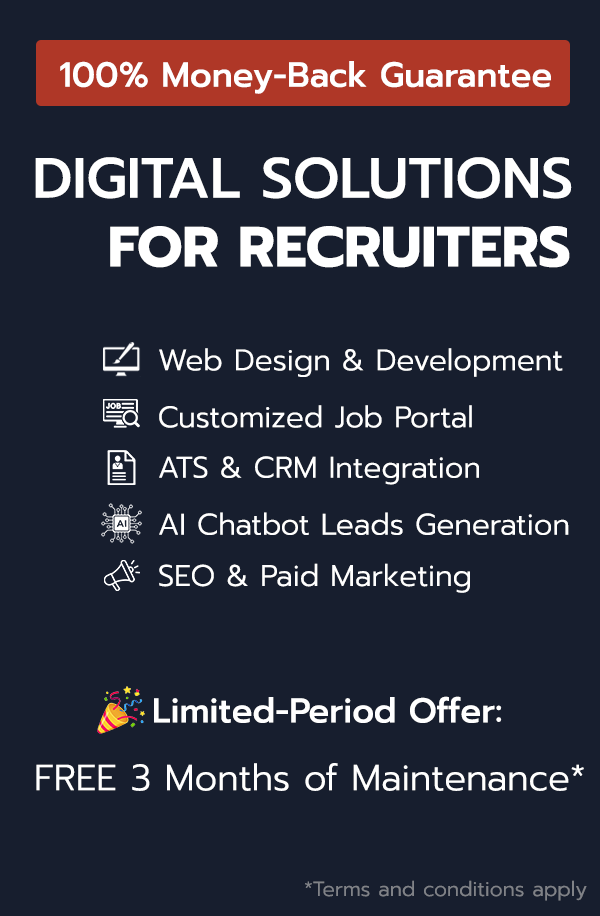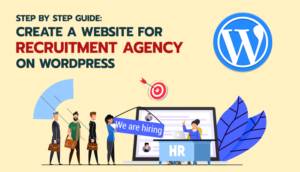Why Effective Marketing Matters for Recruiters?
Recruiters need to be effective at marketing for several valid reasons. Firstly, it helps in building credibility and trust by showcasing testimonials from satisfied clients and even success stories from placed candidates, which represent reliability and proficiency. This clarity reassures potential clients and candidates that they are making the right choice in working with you.
Outlining your wins consistently, over time, works in creating a reputation that speaks of being an expert and a trusted advisor in the recruitment industry. This marketing of visibility and reach is enhanced with a website and active social media presence. For instance, regular posts on LinkedIn can be very effective in attracting a global network of professionals and growing your audience beyond your immediate network. This type of engagement doesn’t just get you seen, it puts you in contact with a broader audience.
When you position yourself as an authority through informative blog posts and webinars, you draw top-shelf candidates who are confident in your expertise and networking capabilities. Additionally, marketing sets you apart from your competitors in the recruitment industry, which is very competitive. Your specialized knowledge and industry sharing set you apart and make you the niche market’s choice.
Crafting Your Unique Value Proposition (UVP) as a Recruiter
Every consultant is oriented to service delivery, and that’s what separates consultants from clients. Your Unique Value Proposition (UVP) is your personal brand, what identifies you among other recruiters in the market. It is a short statement that explains unique benefits and value to both clients and candidates.
The steps to an effective UVP are mentioned below:
Identify your strengths. Consider what you do best — be it your speed in placing candidates or your deep relationships within a niche industry. Such things count as strengths and epitomize what is uniquely valuable about you. The first part of knowing your unique abilities lays the base to create a compelling UVP.
The second aspect is understanding who you are speaking to—that is, understanding your audience. Be aware of the pains and needs of the clients and candidates. By doing that, you will manage to put together your UVP in a way that tries to solve their specific challenges. You make your UVP more relevant and impactful by showing that you understand their issues.
Third, be clear and concise. Your UVP needs to be understood, remembered and recalled. Free from jargon, focus on clarity in impactful statements. Take, for example, the UVP “Connecting top tech talent with innovative companies in record time,” which clearly states what benefit and value you are offering. This clarity and brevity will ensure that your message sticks with your audience.
Finally, be benefit-oriented and test and tweak your UVP. Express the benefits clients and candidates will derive from working with you. If you are exceptionally good at reducing time-to-hire, then add that as a unique selling proposition. Test it with trusted peers or clients, and stay open to feedback to adjust properly so that your UVP resonates with the proper target audience.
Building Your Online Presence as a Recruiter
Creating a Professional Website
First and foremost, there has to be a professional website. It confirms your professionalism and works almost as an electronic portfolio where all your services and knowledge are brought before the world. You will also need to have pages like “About Me,” “Services,” “Testimonials,” and “Blog” so that users are given a full overview of whatever you can help with. This way, the visitor will have a clear view of your capabilities and experience.
Second, a polished website projects your credibility. Not only candidates but also clients will be easier to sell on a good recruiter who has a good online presence. It shows that you mean business and you are reliable in the recruitment field.
Third would be the easy access to information on your website; this means clear display of contact information, services offered, and job listings. The easier visitors can get to this kind of information, the more likely they will be to call and engage with you.
Moreover, your website facilitates lead generation. Add lead generation forms like “Contact Us” or “Subscribe to Newsletter” to obtain information on your prospective clients and candidates. Not only will this help you in database building, but it will also facilitate lead nurturing—turning mere interest into long-term relationships.
Finally, turn to SEO. Effective SEO strategies will have your website pop up whenever a user searches for something relevant to your business. This will increase the volume of organic traffic. Some of the things that will increase your visibility on search engines are keywords, meta descriptions, and quality content.
Optimizing Your Social Media Profiles
Enhance your social media profiles to expand your reach. Platforms like LinkedIn, Twitter, and Instagram can significantly boost your visibility. Share updates on industry trends and job openings to stay relevant and attract potential clients and candidates.
Use social media for professional networking by engaging with industry thought leaders, joining groups, and participating in discussions. This helps you stay informed and connected with the latest developments in your field.
Your social media profiles represent your brand. Ensure consistency in elements like profile pictures, cover images, and posting tone to reinforce your professional image and brand identity.
Social media also facilitates direct communication with clients and candidates. Respond promptly to messages and comments to build trust and show your commitment to excellent service.
Finally, add a personal touch to your profiles. Share behind-the-scenes moments, celebrate achievements, and express gratitude to your network. This creates a more relatable and engaging presence, helping your audience connect with you on a deeper level.
Leveraging Content Marketing
Content marketing is a powerful way to position yourself as a thought leader in the recruitment industry. By sharing valuable insights, trends, and advice through blogs or videos, you can demonstrate your expertise and build trust with your audience. Regularly publishing high-quality content attracts visitors to your site and keeps them engaged.
For instance, a blog post like “Top Tips for Interview Preparation” can draw candidates who might become future clients. Diverse content formats—articles, infographics, videos—appeal to different preferences and strengthen your connection with your audience.
Don’t forget to include calls to action in your content. Encourage readers to subscribe to your newsletter or contact you, turning casual visitors into valuable leads.
Strategies to Secure Client Partnerships
Identification of Your Ideal Client Profile
Start by focusing on industry needs. Point out the industries you understand best and keen to. Exact problems and needs in the said industries shall help you offer well-tailored services. Specialized knowledge on the said makes one not only more efficient in addressing the unique challenges but also an opinion leader and a valuable expert in those fields.
Second, study your past successes for trends. Go back through your placements and objectively examine the happiest clients. Now, think about what industries and roles were most related to these placements. Said analysis will be the key for you to develop the characteristics of who your ideal client is. Knowing what worked will give you a lead to finding those clients who would most appreciate and use your services.
Consider the scale of companies you enjoy serving: start-ups, mid-market, large corporations. Each has different needs and dynamics. Knowing where you excel can allow you to focus your efforts on clients that fit your strengths. This can also relate to corporate culture, one of the factors that can make a difference in finding your ideal clients.
Finally, decide the geographical preferences. One may wish to target the customers who are located in a particular region or may be open to the target being anywhere in the world.
Developing a Client Acquisition Strategy
For a proper strategy in client acquisition, first look within your network for referrals and contacts. Networking is one of the most powerful means of attracting new clients. Attend industry events and join professional bodies; keep in touch with all your contacts. This will enable you to ask for referrals from this network, which may turn out to be very valuable in terms of making high-value introductions.
Another effective strategy is offering free consultations. Provide potential clients with a complimentary initial consultation, allowing them to realize your knowledge and experience. That will let them know what to expect from working with you and, therefore, instill trust. It’s a way for a person to establish capability and set up a very firm base of a future working relationship.
It involves targeted outreach to get ideal clients. Prospect clients and strategize how to personally reach out to them. Address their specific challenges by personalizing your email or LinkedIn messages with exactly how your services can solve their problems.
Case studies of some successful placements can practically raise your credibility. Write up detailed case studies that emphasize the impacts that your work may have on the business of your clients. Share these stories on your website or marketing material as a means to prove your value and track record.
Partner with influencers in your industry to establish new clients. Partnering with thought leaders helps you bootstrap their authority and expands your reach in turn. Co-host webinars, write guest blog posts, or go on industry podcasts to increase your visibility.
Demonstrating Value to Clients
Bringing insight backed by data is key to proving relevance. Sharing time-to-hire, cost-per-hire, and retention rates will quantify that impact. These data points become very important in showing your effectiveness and helping clients understand the tangible value of your services.
Tailor-made solutions prove that you truly understand the unique challenges your client faces. Personalize recruitment strategies to suit their needs and prove the desire for their success. This shall help in trust-building flexibility and responsiveness.
Communication with clients needs to be regular to uphold their trust. Keep clients informed about their recruitment process regularly, take feedback, and address the concerns raised by them. This way, there is complete transparency, and the client will feel involved and reassured.
Probably the most direct way to demonstrate value is through quality candidates. If you can help clients consistently, always bringing forward at least those candidates who meet or even exceed their expectations, you will be showing them that you are capable of finding precisely that kind of talent. It reinforces the reputation as a reliable and effective recruiter.
These long-term benefits would allow clients to see the bigger picture. Bring out how the services provided are going to result in better staff retention and improved performance by the rest of the team. By pointing out the long-term advantages, you underline the value proposition of your recruitment services.
Effective Strategies for Attracting Top Talent
Building Strong Relationships with Passive Candidates
Engaging your potential candidates is critical on LinkedIn. Interact with their content, comment on their posts, and share relevant industry news to build relationships. This will keep you connected and top of mind for them when future opportunities arise.
Another effective method involves attending industry events such as conferences and meetups. Networking in person with prospective candidates enables one to build face-to-face connections, usually creating closer relationships that will bring even better placements in the future. Conferences are a wonderful channel to meet passive candidates and understand what their aspirations are regarding their careers. It positions you as such when you give career counseling. One shares consultancy advice and insight into their careers, either through blog posts, webinars, or one-on-one consultancy. You show you care about their success by sharing tips on resume writing, interviewing, and career development, and engender trust.
Building communities in which passive candidates can engage with you and each other creates belonging, hence engagement. This can be done online, with forums or LinkedIn groups, or off-line, with regular meetups. These provide a continuous platform for interaction, hence helping in building strong relationships over time with passive candidates.
Crafting Compelling Job Postings
When you write clear and concise job descriptions, it will help to make compelling job postings. Outline the primary responsibilities and requirements of the position; avoid the use of jargon. Give candidates the core information they need in order to know whether they’d be a good fit for their roles.
Promotion of the company culture is also important. Lines can be added to the advertisement outlining the values it holds, what mission it undertakes, and what makes it stand apart. This helps in the attraction of candidates with an aligned culture and values to the company and increases the chances of finding the right person.
Another incentive to make the job posting more attractive would be to highlight the benefits and perks. It should be very clearly stated what the position can offer in terms of flexible working hours, health benefits, or potential upward mobility. Sometimes, those little things can spark interest in a job posting.
The language should be interesting and, while writing the job post, very conversational to make it exciting. Such language can engage the potential candidate and arouse him or her to apply for the opportunity.
Finally, optimize job posts for search to drive traffic by using relevant keywords in the title and description. This would increase the visibility of the posting in search results and maximize the exposure to potential applicants.
Creating a Positive Candidate Experience
An effortless application process is key to a great candidate experience. This ought to be in a very simple, headache-free way, and with no huge forms and steps that would scare off the candidates you’re eyeing. The more streamlined the application, the more candidates you will receive.
Communication at each process of recruitment should be clear and prompt. The candidate needs to be updated with respect to his application process and what the next steps are. This kind of timely update reassures applicants that their application is taken seriously and helps manage expectations.
Another key thing is to provide constructive feedback to candidates who will not move on to the next stage of the process. Feedback makes the applicants realize that their effort is duly recognized, and at the same time, it also makes them understand where they have to improve. This can go a long way in making a good impression on the minds of the candidates to apply again if some other suitable opportunity arises in your organization.
Prepare an enabling interview environment. Assist candidates to feel welcome and at ease when interviewing. The better the interview experience, the more positive the reflection on your organization. Little acts of hospitality will go a long way to a candidate’s perception.
Such follow-up after placement depicts that one still cares about the placed candidate. Ensure everything is fine and that they are integrating well into their new roles. This follow-up will not only help in the success of the placed candidate but will increase goodwill, resulting in potential future referrals.
Final Thoughts
With increased competition today, the need to market oneself as the best recruiter cannot be ruled out. You will be roping in some of the finest clients seeking your services and great talent looking for job opportunities by developing a value proposition, building an online presence, securing client partnerships, and attracting top talent.
Note at the bottom line: it’s a process beset with consistency, creativity, and knowing the audience inside out. Practice these, and you’ll be on your way to success in recruitment.
Frequently Asked Questions About Recruiter Marketing
Q1: How much time should I dedicate to marketing myself each week?
The amount of time you need to give to marketing depends on your workload and what your goals are. That said, a good starting point would be at least 8-10 hours per week. This could be anything from creating content, engaging in social media, or networking. The key is consistency—try to find something that fits into your schedule.
Q2: What are some free or low-cost marketing strategies for recruiters?
There are so many free or low-cost marketing tools and techniques that are really effective. Easy networking works wonderfully for personal branding, with social media, valuable content such as blogging or video creation, and simple networking at industry events working very cheaply, if not for free. Also, relationship building by referral and word-of-mouth can be a very powerful technique and relatively inexpensive.
Q3: How can I measure the success of my marketing efforts?
To track KPIs of success, website traffic, social media engagement, lead generation, and conversion rates are all indicative of marketing success. From here, you can use tools like Google Analytics and many insights tools the social media networks offer to your advantage.
Q4: Should I invest in paid advertising for my recruitment services?
Paid advertising can be worth it if you would like to increase reach within your target market at an extremely fast pace. By using targeted online advertising with a platform like LinkedIn, Google Ads, or Facebook, you will better position yourself to attract potential clients and candidates. This does require a very clear strategy and budget laid out for it if you are to get the best value for money. Start small, test the approaches, and make adjustments accordingly.






Share Your Thoughts: